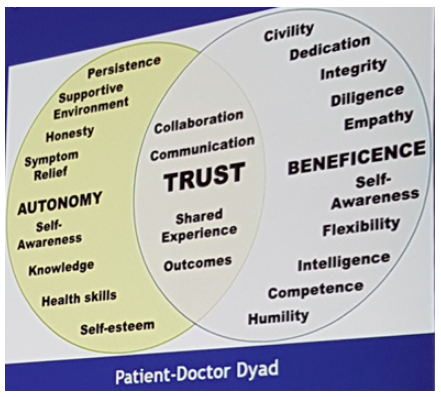A diagram of the patient-doctor dyad with regards to social media summarizes this concept nicely:

With regards to social media and established patients, Dr. Katz notes that there are several “no fly” zones:
- Connecting on any platform – this risks violating trust. Physicians should have no personal account Facebook or LinkedIn friends with their established patients. For Twitter and Instagram, patients may follow you, but you should not follow them back
- Searching for patients online
- Public sharing on social media (or physician review websites)
There are certainly benefits and risks for obtaining information on social media:
Potential benefits:
- Learn how people discuss disease processes and treatment in plain language
- Keep up on new health information with regards to publications, academic meetings, and policies affecting patients and practice
- Affirm accurate information over ‘fake news’
- Potential for distraction
- Exposure to misinformation
- Malware
- Tracking
When deciding when/what to post, Dr. Katz highlights the 4Rs that he has developed [1]:
- Reflective – be thoughtful and humble and ‘agree to disagree’
- Responsive – be an active listener with timely responses
- Relevant – be focused on the current topic
- Rigorous – share valid information based on experience and evidence, and don’t be afraid to acknowledge what you don’t know
Presented By: Matthew Katz, Department of Radiation Medicine, Lowell General Hospital, Lowell, MA
Written by: Zachary Klaassen, MD, Urologic Oncology Fellow, University of Toronto, Princess Margaret Cancer Centre, Twitter: @zklaassen_md at the 2018 ASCO Annual Meeting - June 1-5, 2018 – Chicago, IL USA
References:
1. Bibault JE, Katz MS, Motwani S. Social media for radiation oncologists: A practical primer. Adv Radiat Oncol 2017;2(3):277-280.


